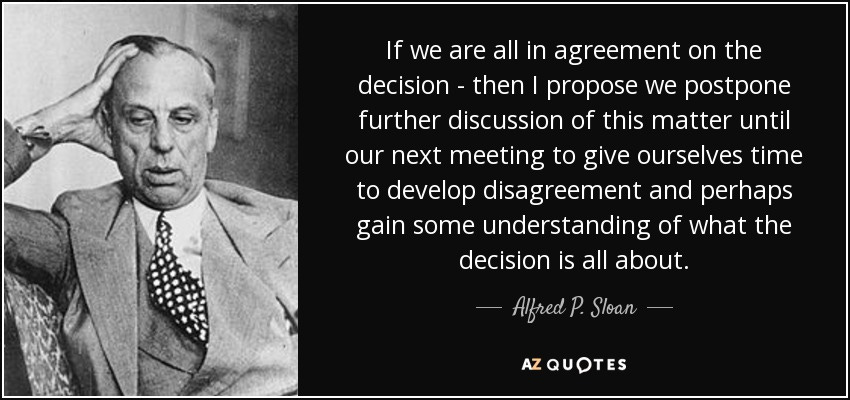The Power of Dissent: How Disagreement Drives Better Decisions (in the Boardroom and Beyond)
Exploring the critical role of constructive disagreement in corporate decision-making
The key work of an Executive and Board of Directors comes down to judgement and decisions.
Decisions — to take or not to take — becomes the most important aspect of their work.
Drucker was a big proponent of the importance of decision-making as individuals and as groups. He had a great story about the decision-making of a group. About dissent as a critical aspect of decision-making.
Peter F. Drucker in his seminal work Management: Tasks, Responsibilities, Practices how General Motor’s (GM) CEO Alfred P. Sloan (one of the critical CEOs in the early 20th century America) modelled this before one of his top committees saying,
“Gentlemen, I take it we are all in complete agreement on the decision here.’ Everyone around the table nodded assent. ‘Then,’ continued Mr. Sloan, ‘I propose we postpone further discussion of this matter until our next meeting, to give ourselves time to develop disagreement and perhaps gain understanding of what the decision is all about.”
In a normal environment, we look for confirmation around the table. We look for what we all can agree on. Sloan emphasised the importance of dissent or disagreement. Why?
From years of strategy and innovation work, around Australia and the world and working with senior executives in large and small organisations, it is clear to me that there is no one right answer. While supporting a large $100B Euro organisation, I started with the twin questions of “who is our customer” and “what does the customer value?”. There was agreement among the top leadership around the customer, and when it came to value, there was tremendous disagreement. This is precisely what I wanted. This enriched the conversation for everyone and provided critical insights for the organisation.
As Roger Martin would say, the opposite of a good strategic choice is also right. It just depends on the context. So the question is not whether this particular choice is right — whether this particular choice is right for us.
If there is no dissent, then we are not actually exploring the various options and discussing the opposite strategic choice too.
In design, the culture is strong on critique. The idea is to have robust conversations about that particular issue before we decide. I have been part of conversations where the critique process can be brutal, but useful in the end.
In boardrooms, this is important. Are Directors doing their duty by questioning the logic of the decision? Do they have different opinions and questions about the same decision? Is the Chair facilitating this openness of dissent and disagreement?
In the famous Centro Case, ASIC vs Healey (2011), each director is expected to “take a diligent and intelligent interest in the information available to them, to understand that information, and apply an enquiring mind to the responsibilities placed upon him or her”.
Let’s look at the alternative.
We all agree to whatever the highest-paid person in the room says.
No one speaks out their concerns.
Decisions are diluted to what can agreeable than what is right.
Over time, we all do the bare minimum to ensure agreement and conformity.
In the end, it all ends up in mediocrity.
Dissent is critical for Decisions. Build that into your decision-making process.
Reader Pointers:
Reflect on your own decision-making processes: Do you actively seek out dissenting opinions? Are you open to being challenged on your ideas?
Consider the role of dissent in your workplace: How does your organization encourage or discourage disagreement? What could be done to foster a more open and honest dialogue?
Challenge the status quo: Don't be afraid to speak up if you disagree with a decision. Remember, the opposite of a good strategic choice can also be right – it depends on the context.
Cultivate a culture of dissent: As a leader, create an environment where everyone feels safe to share their opinions, even if they differ from yours.
Remember the Centro Case: The failure to challenge groupthink can have serious consequences. Be diligent, ask questions, and don't be afraid to disagree.


